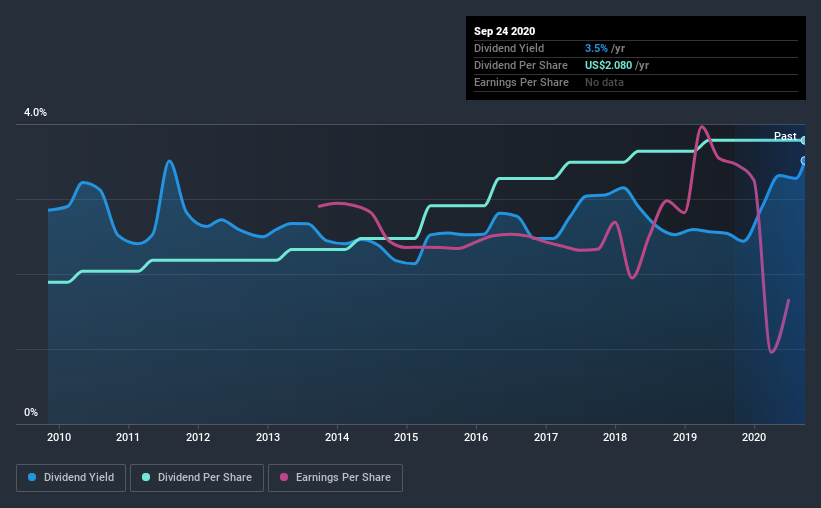Don't Buy National HealthCare Corporation (NYSEMKT:NHC) For Its Next Dividend Without Doing These Checks

National HealthCare Corporation (NYSEMKT:NHC) stock is about to trade ex-dividend in four days. Investors can purchase shares before the 29th of September in order to be eligible for this dividend, which will be paid on the 2nd of November.
National HealthCare's upcoming dividend is US$0.52 a share, following on from the last 12 months, when the company distributed a total of US$2.08 per share to shareholders. Looking at the last 12 months of distributions, National HealthCare has a trailing yield of approximately 3.5% on its current stock price of $59.22. If you buy this business for its dividend, you should have an idea of whether National HealthCare's dividend is reliable and sustainable. So we need to investigate whether National HealthCare can afford its dividend, and if the dividend could grow.
Check out our latest analysis for National HealthCare
If a company pays out more in dividends than it earned, then the dividend might become unsustainable - hardly an ideal situation. Last year National HealthCare paid out 92% of its profits as dividends to shareholders, suggesting the dividend is not well covered by earnings. A useful secondary check can be to evaluate whether National HealthCare generated enough free cash flow to afford its dividend. It paid out 17% of its free cash flow as dividends last year, which is conservatively low.
It's good to see that while National HealthCare's dividends were not well covered by profits, at least they are affordable from a cash perspective. Still, if this were to happen repeatedly, we'd be concerned about whether the dividend is sustainable in a downturn.
Click here to see how much of its profit National HealthCare paid out over the last 12 months.
Have Earnings And Dividends Been Growing?
When earnings decline, dividend companies become much harder to analyse and own safely. If earnings decline and the company is forced to cut its dividend, investors could watch the value of their investment go up in smoke. Readers will understand then, why we're concerned to see National HealthCare's earnings per share have dropped 6.8% a year over the past five years. Such a sharp decline casts doubt on the future sustainability of the dividend.
The main way most investors will assess a company's dividend prospects is by checking the historical rate of dividend growth. National HealthCare has delivered 7.2% dividend growth per year on average over the past 10 years. The only way to pay higher dividends when earnings are shrinking is either to pay out a larger percentage of profits, spend cash from the balance sheet, or borrow the money. National HealthCare is already paying out a high percentage of its income, so without earnings growth, we're doubtful of whether this dividend will grow much in the future.
To Sum It Up
From a dividend perspective, should investors buy or avoid National HealthCare? It's not a great combination to see a company with earnings in decline and paying out 92% of its profits, which could imply the dividend may be at risk of being cut in the future. However, the cash payout ratio was much lower - good news from a dividend perspective - which makes us wonder why there is such a mis-match between income and cashflow. With the way things are shaping up from a dividend perspective, we'd be inclined to steer clear of National HealthCare.
Although, if you're still interested in National HealthCare and want to know more, you'll find it very useful to know what risks this stock faces. For example - National HealthCare has 3 warning signs we think you should be aware of.
If you're in the market for dividend stocks, we recommend checking our list of top dividend stocks with a greater than 2% yield and an upcoming dividend.
This article by Simply Wall St is general in nature. It does not constitute a recommendation to buy or sell any stock, and does not take account of your objectives, or your financial situation. We aim to bring you long-term focused analysis driven by fundamental data. Note that our analysis may not factor in the latest price-sensitive company announcements or qualitative material. Simply Wall St has no position in any stocks mentioned.
Have feedback on this article? Concerned about the content? Get in touch with us directly. Alternatively, email editorial-team@simplywallst.com.

